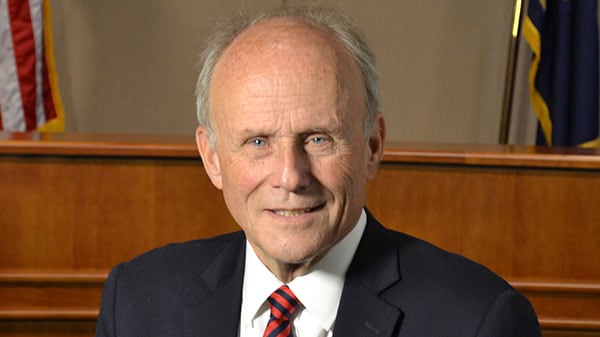When Clackamas County District Attorney John Foote retired Dec. 31, after 20 years in office and more than 30 as a prosecutor, Oregon's criminal justice reformers lost their most determined opponent.
For the past decade, as progressive lawmakers moved to reduce incarceration and decriminalize drugs, Foote made powerful, data-driven arguments in opposition. He produced reports that showed Oregon's criminal justice system focused more on locking up violent felons than nearly any other state and pointed to the stubbornly high rate of recidivism that continued after Oregon shifted to shorter sentences in the 2013 Justice Reinvestment Act.
Foote's parents grew up in Japan, the children of missionaries, and a moral streak ran deep in his conviction that the justice system exists to serve the public and, in particular, victims. Ironically, although Foote, 70, is the grandson, son and brother of ministers, his office's highest-profile prosecutions held to account a fundamentalist Oregon City sect, the Followers of Christ, who allowed several children to die because of their belief in faith healing.
We caught up with Foote for an exit interview in his final days in office. His answers have been edited for brevity and clarity.
Over the past 25 years, crime rates in Oregon and nationally have plummeted. Why?
Contrary to what anyone has to say today, enforcement reduces crime and incarceration reduces crime. Everything else is much less effective. When somebody is in a prison cell, they are not burglarizing your house or stealing your car or committing rapes or murders. The question is, what is the balance we want?
Why do you think Americans incarcerate such a larger percentage of the population than most other Western democracies?
The United States is this incredibly diverse, dynamic and historically violent place. And then we have more wealth and personal freedom than any country, perhaps in human history. When you give a group of humans, a lot of personal freedom and a lot of wealth, there are a lot of stupid things that happen. That's part of it. I also think that the idea of a nuclear family has just just been dismantled in this country.
Criminal justice reformers say incarceration needlessly destroys many inmates' lives. Your response?
When they talk about crime, the advocates often talk about criminals as if they are the victims. It's very alluring. I'm not denying that people who commit crimes also have a human story. But in the crime they committed, they are not the victims. Whatever happened to you is not an excuse for you doing something horrible to somebody else.
There's been a lot of pushback against Oregon's sentencing laws, particularly Measure 11. Your association wrote a report in 2018 that argued for those laws. What was your case?
In Oregon at that time, we had among the highest percentage of any state of its inmates in prison for violent crime. And our incarceration rates were well below the national average. There were tens, or maybe even more, of thousands of victims who those laws saved from violent crimes. We were doing many things right, including giving victims a much more powerful voice in the system.
We were completely out of balance before the voters and victims started pushing for reforms. And that I think is what caused the drop in crime. Some people say poverty causes crime. There's just no statistical evidence to show that's true. So what does drive crime? It's impulsive acts, it's anti-social thinking, and it's the lack of enforcement and no fear of consequences.
If you are right, why have anti-incarceration advocates won the day in Oregon?
I think that the vast majority of people don't know the world of crime, what it's really like and how it impacts victims. And they are very susceptible to platitudes about easy solutions that ease their conscience about having prisons. I mean, these advocates never use the words "crime victim."
So do you think that the people who have pushed against that balance were lulled into a false sense of security by the success of the system?
People taken for granted that things have been so much better. But I think there's more to it than that. People decide what they believe And then they look for facts to support what they believe, not the other way around. And in my profession, we don't do it that way. We decide what evidence we have before we decide what we can prove. And you see that in criminal justice, these ideologues, they believe certain things. And if the evidence doesn't back up what they're saying, they either manipulate the evidence or they don't talk about it. For instance, if you look at what's happened since Justice Reinvestment Act passed in 2013, guess what has gone up? Recidivism.
Your office's most famous cases involve prosecuting the Followers of Christ for the deaths of several children. What happened?
I am not an enemy of religion. This was not about faith. This was about children. When I took office, I heard about the deaths. And I knew that it had never been prosecuted and that the church up there believed authorities were not going to do anything. So I asked my chief deputy, Greg Horner, to meet with the leadership and warn them that that was no longer true.
These were unique criminal cases. When the medical examiner and law enforcement would show up at the scene, it could be 50 to 150 people in the house and nothing would be preserved. Second, everyone who was interviewed would say: The child exhibited no symptoms before dying. But, of course, they were all there praying over the child because they knew the child was dying.

